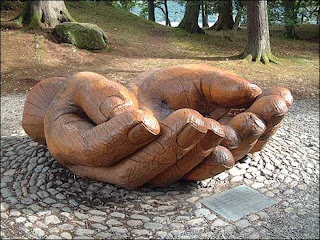But today I'm thinking about places in the US where this fear has already come true. I hope everyone is aware of places like T. Don Hutto: America's Family Prison in Texas and the increasing number of privatized prisons being used to house thousands of detained immigrants.
And then, there's the fact that, according to Children's Defense Fund, black boys have a one in three lifetime risk of going to jail, and Latino boys a one in six lifetime risk of the same fate. Of course, for many of these young ones, getting to jail would be better than becoming a victim of the violence they live with every day on the streets. As Bob Herbert pointed out last year, 34 children were killed on the streets of Chicago in less than a year.
So often these days, we live by anecdote. But a situation last week brought much of this home to me. Did you hear about 5 year old Dennis Rivera who was handcuffed by police and taken to a psych ward for having a tantrum in kindergarten? I heard about this particular incident at Jack and Jill Politics where dnA had this to say:
This problem escapes national attention because Americans are conditioned to rationalize people of color as being meant for prison from birth, and therefore there's little outrage over treating a five year old child like a criminal if he or she is black or Latino.
The children most likely to attend a school where they can be treated like a criminal in a prison rather than a student in a school tend to be poorer and not white.
Part of this is that the school system has given up on these kids, and these schools often end up not being schools but overcrowded warehouses for human beings the city doesn't want to deal with. The appearance of order in the city's schools takes precedent over educating its students.
They don't want to teach these kids. They just want to stick them somewhere they can control (police?) them until they turn 18 or drop out, whichever comes first.
I can feel dnA's anger in this post. We all know that there are good people doing great things in some of these schools. But overall based on my experience, I think these words speak loudly and truthfully to what is happening to our African American and Latino kids in urban areas. Just as many of us needed to be awakened to the prevalence of racial profiling by law enforcement and the dangers of "driving while black," I think we now need to recognize that thousands of children every day in our urban public schools, libraries, parks and streets are being criminalized for "growing up black/brown" and doing things that previously would have resulted in detention at school and/or grounding by our parents.
Unfortunately we have grown accustomed to the idea of armed police officers and metal detectors in our schools. And I recently wrote about this kind of thing being imported to our public libraries as well. One of the bi-products of these choices we're making out of fear is that we increasingly criminalize the behaviors of our children (especially those of color) and fuel the Cradle to Prison Pipeline that the Children's Defense Fund is talking about.
From what I have seen, the problem with changing these circumstances is that the parents of these children do not have a voice in our systems. Some of that is due to things like addiction and mental illness. But a lot of it is also the result of a complete lack of trust that any of us will listen or that anything better can happen. We've recently been talking to staff at our local office of the Children's Defense Fund. The national office that published the report I linked to above is trying to work with local chapters to raise awareness about this problem and mobilize coalitions to get busy trying to change things. If you'd like to get involved, I'd suggest you call the CFD office nearest you.








